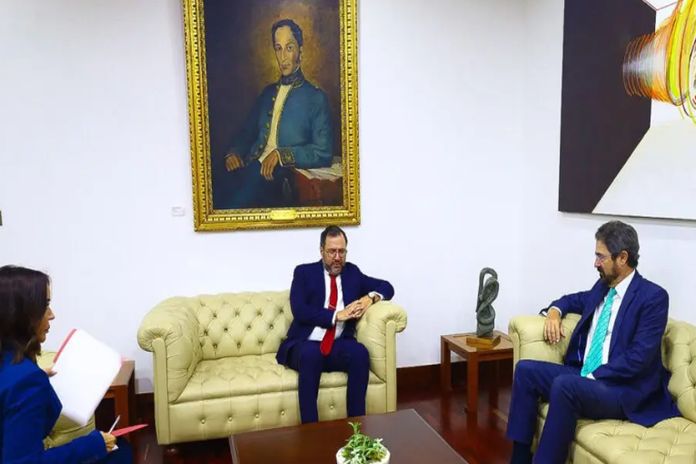- Caracas blasted Washington’s “total disdain for international law” in the wake of the latest targeted sanctions.
By Ricardo Vaz
PORTUGAL, (venezuelanalysis.com) – The Nicolás Maduro government has decried Washington’s imposition of new individual sanctions against high-ranking Venezuelan officials.
“Venezuela rejects this renewed aggression with the imposition of unilateral, illegitimate and illegal coercive measures against state functionaries,” read a statement issued last Thursday. Caracas argued the measures reinforced the US’ “total disdain for international law.”
The Maduro administration went on to accuse its US counterpart of seeking to impose regime change and vowed that the “Venezuelan people’s dignity” would defeat destabilization plans.
Earlier on Thursday, the US Treasury’s Office of Foreign Assets Control (OFAC) levied sanctions against 16 Venezuelan individuals from judicial, security and electoral bodies, alleging that they “obstructed a competitive and inclusive presidential election” in the Caribbean nation.
“The United States is taking decisive action against Maduro and his representatives for their repression of the Venezuelan people and denial of their citizens’ rights to a free and fair election,” deputy secretary of the Treasury Wally Adeyemo stated.
The sanctioned officials include Supreme Court (TSJ) president Caryslia Rodríguez and four other TSJ justices; prosecutor Luis Dueñez and judge Edward Briceño, who respectively requested and approved an arrest warrant for US-backed former candidate Edmundo González; National Electoral Council (CNE) Rector Rosalba Gil; Armed Forces Commander Domingo Hernández; and National Assembly vice president Pedro Infante.
From this moment, the blacklisted individuals are barred from entering the US and will see any assets owned in US territory frozen. The US Treasury Department has now sanctioned more than 140 Venezuelan officials.
Apart from the targeted sanctions, Washington has likewise imposed sectoral coercive measures against Venezuelan banks, mining enterprises and especially the oil industry. Analysts and multilateral organizations have denounced the blockade’s devastating effects on the Venezuelan economy and human rights impact.
The latest round of sanctions followed the Biden administration’s backing for the hardline opposition’s victory claims in the July 28 presidential elections.
The CNE proclaimed Maduro the winner with 52 percent of the vote. The results were later ratified following a Supreme Court review, with the two-term president set to remain in office through January 10, 2031. However, the CNE did not publish its customary broken-down voting totals.
The Venezuelan opposition, led by far-right María Corina Machado, refused to recognize the outcome and published a purported set of electoral tallies online that had González winning by a landslide.
The US and regional allies including Argentina and Chile have supported the opposition’s stance and rejected the official results. In contrast, Russia, China and other Latin American countries grouped in the ALBA alliance have congratulated Maduro on reelection and condemned foreign meddling in Venezuelan affairs.
Tensions build between Caracas and Madrid
The fallout from the July 28 contest has also led to strained relations between Venezuela and Spain.
On Friday, Venezuelan foreign minister Yván Gil announced that he was recalling ambassador to Spain Gladys Gutiérrez for consultations. He went on to summon Spanish ambassador to Venezuela Ramón Santos Martínez for a meeting on Friday afternoon.
In a social media message, Gil reported that he told the Spanish representative that Caracas would not accept any “meddling actions” from Madrid and would defend its sovereignty in accordance with international law.
The latest controversy stemmed from comments by Spanish defense minister Margarita Robles, who referred to the Latin American nation as “a dictatorship.”
Earlier in the week, the Venezuelan National Assembly likewise called diplomatic relations with Spain into question, with the parliament’s president Jorge Rodríguez urging the government to cut all ties with the European country, including commercial dealings and direct flights.
Rodríguez’s request responded to a symbolic vote whereby the Spanish Congress of Deputies recognized González as the winner of Venezuela’s election and requested that the Pedro Sánchez government do the same.
For his part, Sánchez stated his administration would ignore the petition and stick to the common European Union position. According to EU foreign policy chief Josep Borrell, the body refuses to accept the results without a “transparent verification” of electoral records.
The straining of ties comes in the wake of González’s departure to Spain. Despite the existence of an arrest warrant on charges including usurpation of functions and forgery, the Maduro government granted the former diplomat safe passage to flee the country.





